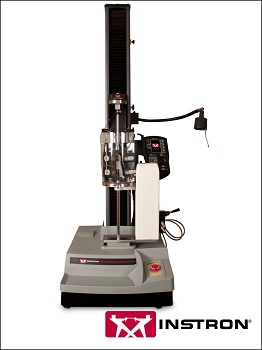Dec 7 2012
Instron, a leading provider of testing equipment solutions designed to evaluate mechanical properties of materials and components, introduces the BioCoat: a polyurethane protective cover designed for Instron® Series 5940 single column testing systems.

Applications performed on the systems include mechanical low-force in-vitro testing of biomaterials and components as well as materials for medical and biotechnology devices in temperature-controlled baths containing fluids such as water, saline solutions, blood or blood simulation products. The cover prevents leaking or spilled fluids from these baths from penetrating into the test system and damaging its sensitive electronic components. The BioCoat’s extremely smooth surface enables contaminations to be removed easily and is resistant to the usual detergents. The cover is available as a separate component and can be retrofitted on the test frame in just a few steps. All connections and controls remain easily accessible, and the system's functionality is fully retained. The BioCoat is compatible with all fixtures, grips, baths, extensometers, and platens from the Instron standard range of accessories.
Biomedical testing is a typical application for Series 5940 single-column testing systems. Instron® 5942, 5943, and 5944 systems combine high accuracy and optimum flexibility to meet a wide variety of requirements when testing medical devices and biomaterials such as tissues, elastomers, wires, or films. Their small footprint saves valuable space in the test laboratory. A high-stiffness test frame ensures optimum repeatability of test conditions and reliable test results. Test speeds range from 0.05 to 2500 mm/min; nominal force capacities are 0.5 kN for the 5942 system, 1 kN for the 5943, and 2 kN for the 5944 system.
All three are designed to work with both Instron's BioPuls submersible grips and Instron’s BioPuls bath, specifically dedicated to biomedical testing. The particularly light-weight pneumatic grips are easy to fasten and to align, and prevent slippage of the specimens under load. Typical applications include tests conducted at very low force (such as testing hydrogels, contact lenses, or filaments) as well as testing natural or artificial tissues, tubing, or foils at loads up to 250 N. The BioPuls temperature-controlled bath enables precise simulation of the conditions present in a living organism. The pneumatic lifting device facilitates handling, increases productivity and minimizes the risk of contamination of the laboratory environment. The bath can be used together with high-precision, non-contacting Instron® AVE video extensometers, which—unlike conventional clip-on extensometers—have no adverse effects on delicate specimens.